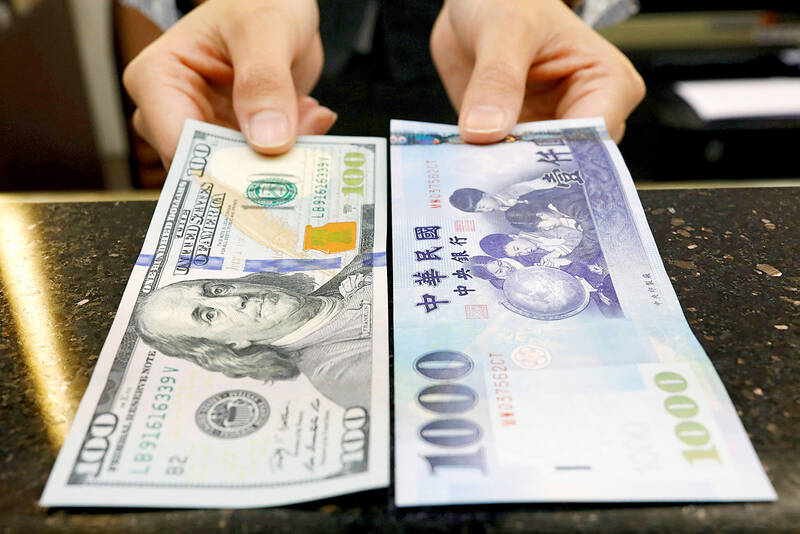Taiwan’s biggest insurers posted a total loss of almost NT$19 billion (US$624 million) last month due to currency volatility after US President Donald Trump warned of a wave of global trade tariffs.
The insurers sustained the worst shortfall in a single month in one-and-a-half years, the Chinese-language Economic Daily News reported.
Among the six biggest, Nan Shan Life Insurance Co (南山人壽) posted the largest loss at NT$9.09 billion. KGI Life Insurance Co (凱基人壽) was the only one among the largest to avoid a hit, reporting a net profit of NT$431 million.

Photo: Tyrone Siu, Reuters
The big shortfalls came even before the New Taiwan dollar’s spike early this month against the greenback, which raised concerns about the industry’s hedging and investment strategies.
Shares of the insurers rose yesterday, buoyed by a broad rally in the region after the US and China agreed to temporarily lower tariffs.
“Taiwan dollar has weakened over the past few days and if that can continue, it can take pressure off their earnings,” Bloomberg Intelligence analyst Steven Lam said.
Insurers are also benefiting from the stock market recovery, with last month’s earnings now backward looking, he said.
Cathay Life Insurance Co (國泰人壽) reported a loss of NT$2.57 billion last month due to higher hedging costs, Cathay Financial Holding Co (國泰金控) said in a statement.
The firm said Trump’s tariff announcement last month exceeded expectations, raising hedging costs.
Fubon Life Insurance Co (富邦人壽) reported a net loss of NT$2.41 billion, citing volatile global financial markets due to US trade policies, while Shin Kong Life Insurance Co (新光人壽) posted a net loss of NT$3.81 billion and Taiwan Life Insurance Co (台灣人壽) had a net loss of NT$1.32 billion last month.
The losses add to evidence that Taiwan’s life insurers might be overexposed and under-hedged relative to their US dollar investments.
The NT dollar rose more than 6 percent in the first two trading days of this month, effectively reducing the value of unhedged US dollar investments, leading the Financial Supervisory Commission to offer assurances on Tuesday last week that no insurers have had solvency issues so far.
The central bank the same day announced it would inspect banks to ensure that fund inflows are for investment, not currency speculation. The NT dollar has since stabilized.
Fubon Life said it has increased its hedging to mitigate the currency effects of NT dollar gains, adding it would closely monitor the market and dynamically adjust its hedging to handle currency risks.
Cathay Life, which had its first monthly loss since last year, said hedging costs rose last month, but the effect is controllable.
Goldman Sachs Group Inc analysts said in a note released on Thursday last week that a 10 percent appreciation of the NT dollar against the greenback could lead to about US$18 billion of unrealized currency losses for local insurers, who hold about US$710 billion of foreign currency assets.
Such a move would wipe out the roughly US$6.6 billion reserves insurers have for currency volatility, Goldman’s analysts wrote.

In Italy’s storied gold-making hubs, jewelers are reworking their designs to trim gold content as they race to blunt the effect of record prices and appeal to shoppers watching their budgets. Gold prices hit a record high on Thursday, surging near US$5,600 an ounce, more than double a year ago as geopolitical concerns and jitters over trade pushed investors toward the safe-haven asset. The rally is putting undue pressure on small artisans as they face mounting demands from customers, including international brands, to produce cheaper items, from signature pieces to wedding rings, according to interviews with four independent jewelers in Italy’s main

Macronix International Co (旺宏), the world’s biggest NOR flash memory supplier, yesterday said it would spend NT$22 billion (US$699.1 million) on capacity expansion this year to increase its production of mid-to-low-density memory chips as the world’s major memorychip suppliers are phasing out the market. The company said its planned capital expenditures are about 11 times higher than the NT$1.8 billion it spent on new facilities and equipment last year. A majority of this year’s outlay would be allocated to step up capacity of multi-level cell (MLC) NAND flash memory chips, which are used in embedded multimedia cards (eMMC), a managed

In the wake of strong global demand for AI applications, Taiwan’s export-oriented economy accelerated with the composite index of economic indicators flashing the first “red” light in December for one year, indicating the economy is in booming mode, the National Development Council (NDC) said yesterday. Moreover, the index of leading indicators, which gauges the potential state of the economy over the next six months, also moved higher in December amid growing optimism over the outlook, the NDC said. In December, the index of economic indicators rose one point from a month earlier to 38, at the lower end of the “red” light.

The global server market is expected to grow 12.8 percent annually this year, with artificial intelligence (AI) servers projected to account for 16.5 percent, driven by continued investment in AI infrastructure by major cloud service providers (CSPs), market researcher TrendForce Corp (集邦科技) said yesterday. Global AI server shipments this year are expected to increase 28 percent year-on-year to more than 2.7 million units, driven by sustained demand from CSPs and government sovereign cloud projects, TrendForce analyst Frank Kung (龔明德) told the Taipei Times. Demand for GPU-based AI servers, including Nvidia Corp’s GB and Vera Rubin rack systems, is expected to remain high,